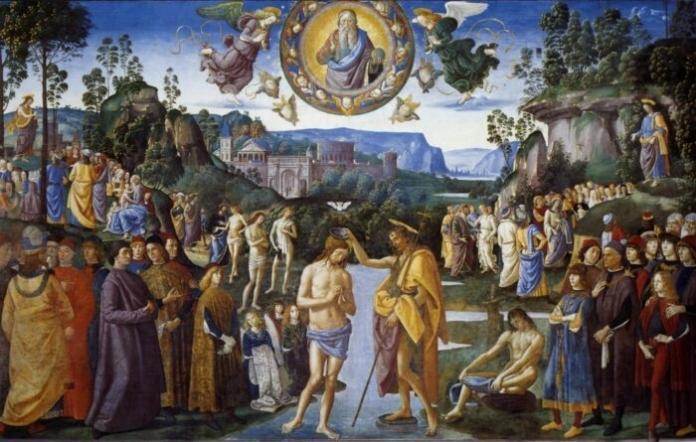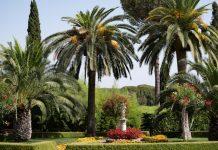His preaching produced a large popular movement toward virtue, such as had never been seen in the history of Israel.
Newsdesk (June 24, 2021, 17:05, Gaudium Press) Saint John the Baptist led a life of prayer and penance in the desert. God inspired him to leave his retreat and begin to preach throughout the region of the Jordan River. Thus Malachi’s prophecy was being fulfilled: “I will send my messenger to prepare my way” (Malachi 3:1).
A man came, sent by God; his name was John
Also, Isaiah prophesied his coming, as the four evangelists attest. There had not been a prophet in Israel for 400 years. The Apostle whom Jesus loved most describes the arrival of this extraordinary man in these words: “A man came from God, sent by God; his name was John” (John 1:6).
This extraordinary event occurred when Tiberius Caesar, the stepson of the famous Augustus, was the Roman emperor. Pontius Pilate ruled over Judea, at that time entirely dependent on Rome. Herod Antipas, son of Herod Idumeus, was the king of Galilee, and Annas and Caiaphas, the high priests (cf. Luke 3:1).
St. John the Baptist attracted crowds: “All Judea and all Jerusalem came out to meet him” (Mk 1:5). Even disreputable women, publicans, and soldiers went to see John the Baptist. The publicans did not enjoy a good reputation because they usually stole while collecting taxes. The soldiers – from Herod Antipas’ army or Roman legionaries – were often adventurers, insolvent debtors, profiteers, bandits, vagabonds.
The Precursor said to them, “Convert, for the Kingdom of Heaven is coming” (Mt 3:2). To convert here means to change their lives and their thinking. They needed to leave their vices, their attachment to earthly things, their self-indulgence, and turn to God, practicing the Commandments and making sacrifices. And he added, “Bear fruit that will show your conversion” (Lk 3:8). “These fruits, that is, these acts of penance will show the truthfulness of your conversion.”
Pharisees and Sadducees went to meet the Precursor…
“His preaching produced a great popular movement toward virtue, such as had never been seen in the history of Israel. The people, amazed by the personality and preaching of John the Baptist and seeing in him a great saint, asked him if he was the Messiah. He answered with his luminous righteousness and humility, “I baptize you with water, but He who is more powerful than I is coming. I am not worthy to untie the lace of his sandals. He will baptize you with the Holy Spirit and with fire.” (Luke 3:16)
“The Pharisees and Sadducees, whose influence dominated the entire Jewish socio-political landscape of that time, were always very attentive to any variation in public opinion. For it was not convenient for them to lose the support of the grassroots of society. The enthusiasm for the Precursor grew in the crowds, who flocked to hear him. It represented a threat to the power of the members of both parties.”
“Wanting to give the impression that they had also joined the surge of religious fervor, they decided to go and meet John. Nevertheless, since they thought themselves perfect to the point of being sinless, their intention was not to confess their faults. Their intention was only to receive baptism as a stamp to justify them in the eyes of public opinion.”
… who rebuked them with a loud voice
Knowing their terrible intentions, the Precursor rebuked them: “Breed of poisonous snakes, who has taught you to flee from the wrath that is coming? The ax is already laid to the root of the trees, and every tree that does not bear good fruit will be cut down and thrown into the fire” (Mt 3:7, 10).
“And we must not imagine St. John saying this in a low voice or an understated manner. Surely he possessed a powerful voice that, we may say, reached the backbone of his listeners as if God Himself were speaking to them. Indeed, John, ‘filled with the Holy Spirit’ (Lk 1:15), represented God and conveyed his will.” “It is undoubtedly harsh and severe language but inspired by zeal and mercy; it is sometimes necessary to strike great blows at hardened and haughty sinners.”
And referring to the Messiah, St. John the Baptist said: “The wheat He will keep in the barn, but the straw He will burn up in an unquenchable fire” (Mt 3:12). The wheat represents the men who believe in Our Lord, the straw, the unbelievers and stubborn sinners; the barn, the Church and Heaven; the unquenchable fire, Hell. “Thus, the camps were being divided within Jewish public opinion itself, as later events came to confirm.”
“Behold the Lamb of God”
St. John the Baptist baptized those who wished to do so. This baptism “did not impress character, forgive sins, or confer grace, because, although inspired by God, it was symbolic […] Therefore, all those who were baptized by St. John must be baptized again by the Apostles (cf. Acts 19:3-6). Over time, disciples appeared to assist him. For example, St. John the Evangelist and his brother, St. James the Greater, were faithful disciples of the Precursor who later became Apostles of Our Lord.
At one point, Jesus Himself came to meet St. John the Baptist and asked him for baptism. When the Precursor saw Him, he said, “Behold the Lamb of God who takes away the sin of the world” (John 1:29), and then he baptized Him. Throughout the centuries, the priests have repeated these words during the Mass. That is when he shows the faithful the Host just before Communion.
By Paulo Francisco Martos
(in “Notions of Sacred History” – 147)
………………………………………………………………..
1 – Cf. FILLION, Louis-Claude. La sainte bible avec commentaires – Évangile selon S. Luc. Paris: Lethielleux. 1889, p. 96.
2 – Idem, ibidem, p. 94.
3 – CLÁ DIAS, João Scognamiglio. EP. New Insight on the Gospels. Vatican: Libreria Editrice Vaticana; São Paulo: Lumen Sapientiae Institute, 2014, v. III, p. 157.
4 – CLÁ DIAS, op. cit. 2013, v. I, p. 33-34.
5 – Idem, ibidem, p. 34.
6 – FILLION, La sainte bible avec commentaires – Évangile selon S. Matthieu. Paris:
7 – Lethielleux. 1895, p. 72.
8 – Cf. Idem, ibidem, p. 75.
9 – CLÁ DIAS, op. cit., 2012, v. V, p. 165.
Idem, v. V, p. 166.



































